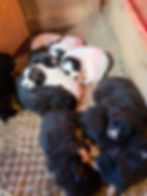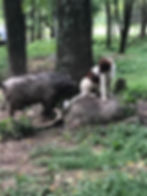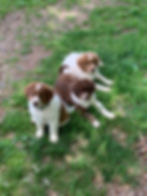Karakachan Livestock Guardian Dogs
When I began with my "gift" of three bottle babies one spring, I had the land but no proper fencing or shelter for them and learned very quickly that I had done things backwards. I always recommend to prospective goat owners to have their facilities in place before getting the animals. Good fencing is extremely important for keeping the animals where you want them and to keep predators out. I also learned the hard way after I had had my goats for a couple of years, that I also needed more than good fencing. I will never forget finding some of my goats dead and dying after a neighbor's dogs had gotten in with them. It was then that I began my partnership with livestock guardian dogs to keep my animals safe.
Over the years, I have had several breeds of guardian dogs and they have worked well protecting my livestock. But In 2007, after I got my first Karakachan from Dr. Phil Sponenberg who brought the first of this breed to the US from Bulgaria a few years before, I knew that I had found the best canine fit for my farm. I was so impressed with these smart dogs who are dedicated to their job and have wonderful temperaments. I never intended to breed but found some of my dogs to be such well-balanced guard dogs that I felt their genes could add a lot to preserving what is best about his breed. To achieve this goal of breeding only the best, I only breed dogs who have had a health evaluation and, at the very least, had their hips tested (my breeding dogs have been PennHip or OFA tested) and are at low or mild risk of developing Osteoarthritis). Ensuring that my puppies optimize the thousands of years of breeding as guard dogs, I work hard to get my puppies off to a good start. I use both the Early Neurological Stimulation (ENS) and Early Scent introduction (ESI) process with the puppies when they are very young. As they mature I provide lots of opportunities for socialization and, daily variations in their surroundings so that they grow into confident, resilient, environmentally aware livestock guardian dogs. They are with goats and chickens and, in the spirit of breed preservation, they are only sold to working farms. Puppies will be placed with their new owners between 10 and 12 weeks and will already have been working with a mentor adult to begin their training. Prospective owners should contact me with information about what they are looking for in a livestock guardian dog, what would his duties be, and the new owner's experience with working dogs. More information about Karakachans can be found at the American Karakachan Dog Association web site.
The Dogs of Kid Hollow Farm
(Click on the picture of the Dam and Sire in the Foundation Dogs section at the bottom of this page to see their pedigrees.)
Delyana and Raz's litter of 12 was born 11/14/2025. All 7 girls and 5 boys are white/red and thriving.
Click here to see the shared photo album and watch how they grow. This litter is the 4th generation of my Rosie line. She is still sound and guarding at 14. All of my dogs have been PennHip and health tested. These puppies are born next to goats and chickens and have gone through ENSS exercises.





Previous Litters




































































Finally out


Three days old
Foundation Dogs
To see a copy of the adult dog's pedigree, click on the dog's image and then on "Go to link." All breeding dogs have been PennHip certified.






Daughter of Rosie

Otis is one of Rosie's sons.





My first Karakachan in 2007.

Rosie has a incredibly calm personality.

Henry guarding his rock.

Securing his claim.

Henry rolling off his rock.

The humiliation is complete.


Guarding the boys
Puppy Gallery







Enjoying the rain


Otis with his brother Luka

Learning to share

Exhausted after a morning of play

Pups learning to get along with others
